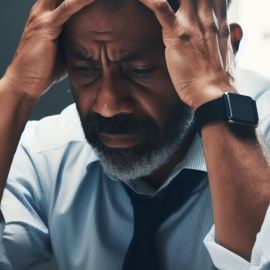

This article is an excerpt from the Shortform book guide to "Bittersweet" by Susan Cain. Shortform has the world's best summaries and analyses of books you should be reading.
Like this article? Sign up for a free trial here.
Want to know how to cope with grief and loss? What are some healthy coping methods?
Dealing with grief and loss is a complex process that can leave us feeling lost and alone. However, in her book Bittersweet, author Susan Cain offers two methods that help to ease the suffering and allow us to carry on without moving on.
Read on to learn how to cope with grief and loss, according to Cain’s two methods.
How to Cope With Grief and Loss
There are no simple solutions for how to cope with grief and loss, and author Susan Cain reasons that although we can learn to accept our own mortality and the impermanence of our own lives, we might find it harder to bear the fact that we’ll eventually lose the people we love.
We can recognize this fact’s inevitability without feeling at peace with it. The pain of losing our loved ones comes from knowing that we’ve been separated from them, and we don’t know if we’ll ever be reunited. This makes loss extremely difficult to cope with.
(Shortform note: As Cain states, grief for the loss of loved ones often feels all-consuming in its pain. Additionally, unlike our own mortality, it’s nearly impossible to prepare for. Some psychologists suggest this is because we can’t prepare for future pain, specifically: The most we can do is anticipate the pain and make ourselves miserable in the present. The powerlessness of grief is also difficult to prepare for—we can’t do anything to bring our loved one back, so we feel crushed by our lack of control. Finally, we may feel like we’re betraying our loved one if we try to prepare for their loss in advance. To let go of our fear of losing them, we have to let go of our attachment to them. This can feel like loving them less, even though that probably isn’t true.)
Knowing how to cope with grief and loss can be especially difficult in Western cultures—though we all experience the pain of grief and loss, people in modern Western culture often view extended periods of bereavement as inconvenient, self-indulgent, and even shameful. They prefer to keep death out of sight, so they feel uncomfortable with open displays of mourning. They most admire those who are able to keep their grief hidden.
Cain asserts that it doesn’t have to be this way and we can learn how to cope—instead of ignoring the existence of loss and grief, we should treat it as an inevitable, normal part of life. When we normalize grief and allow ourselves and others to display and experience it fully, we realize we’re not alone, and we can find comfort in our shared pain. This feeling of understanding and connection with others can help ease our suffering, if only a little.
| How to Support Someone Who’s Grieving Feeling like we have to hide our grief because it makes other people uncomfortable or is somehow shameful can be an isolating experience, making an already difficult time worse. However, as Cain argues, it doesn’t have to be this way. We can normalize grief by actively supporting those who are going through loss and making space for their pain, no matter how long it lasts. To help others cope, here are some ways you can support people during their bereavement: – Keep in touch regularly, and continue to do so when most people have stopped. Bereaved people often have trouble reaching out, so you can help them by taking the initiative. – Instead of asking how they are (most likely, they’re not well), ask how they’re feeling today—this will give them an opportunity to express whatever emotions or thoughts they want to share. – Don’t be afraid to talk about the person they lost. It may be difficult for your friend to talk about their lost loved one, and they may cry. But, it’s better for you to show that their loved one will be missed and remembered than to pretend they never existed. – Instead of offering advice, listen. People often process grief by telling stories about their loved ones, even if it’s the same one over and over. Your understanding is more valuable than your advice at this time. – Reserve judgment. Loss is a huge life change, and grief can’t be rushed. Let your loved one heal in their own time. |
Cain outlines two methods for learning how to cope with grief and loss, which she encountered while conducting her research:
Method #1: Accept the Complexity of Grief
According to Cain, psychology experts assert that we should acknowledge the complexity of grief and our resilience in the face of it. Grief doesn’t just manifest as a long period of sorrow that slowly fades over time—it’s often full of complicated, layered emotions that involve both sadness that the person is gone and joy that comes from your memories of them or the ways they influenced you. For example, we may laugh at a funny story someone tells about our lost loved one and cry minutes later over a picture of them. We have to accept the coexistence of these positive and negative feelings and learn to live with an ever-present pain.
(Shortform note: In explaining how to cope with grief and loss, Cain discusses the emotional complexity of grief, which can involve both negative and positive emotions that are difficult to navigate. However, beyond this emotional experience, grief can manifest in other complex, unexpected, yet deeply affecting ways. We might experience physical reactions like sleep disruption, fatigue, and headaches. Additionally, we might have cognitive reactions like confusion, difficulty focusing and making decisions, or even short-term memory loss. If you’re going through a loss, know that the grieving process is different for everyone, and there’s no correct timeline or procedure to follow to work through your grief.)
Method #2: Find Comfort in the Promise of an Afterlife
Cain relates that many people of varying religious and spiritual traditions ease the suffering of loss with the belief that they’ll see their loved ones again in the afterlife. Therefore, they can take comfort in knowing they only have to endure the pain of separation for a finite period of time.
(Shortform note: Instead of feeling comforted by religion during a time of loss, some people experience a loss of faith when they’re grieving. This is especially common for people who’ve spent many years devoted to their religion. They may feel punished and betrayed by God through their loss, and they may reject their spiritual ties out of anger. This can lead to complicated grief, which typically doesn’t abate on its own and leaves the mourner feeling stuck and despondent. In these cases, it’s important that the grieving person sees a therapist who can help guide them through the changes in their life.)
Cain’s View: Carrying on Without Moving on
To conclude her explanation of how to cope with grief and loss, Cain states that grief is just love manifesting in a different form, so it stays with us as long as we still love the people who are gone. Ultimately, we don’t have to let go of our grief to take positive steps forward after a loss. We can find new connections and happiness while carrying the pain of loss—the grief we carry means we exist in a state of ever-present bittersweetness, where joy and love are always intertwined with sadness.
| How to Handle Outside Pressures When Coping With Grief Despite Cain’s assertion that we don’t have to move on from our grief to move forward, you might experience pressure from people around you pushing you to feel better and get over your grief before you’re ready. If you find yourself in this situation, first, consider your own internalized beliefs about grief and how they might affect your response to pressure from others. If you already feel like you should be coping better or faster, you’ll likely experience more shame and doubt if others question you as well. Then, remind yourself that there’s no correct way to grieve—every person handles loss differently, and it’s often a very confusing process that we only understand when we go through it ourselves. If you recognize and accept this, you’ll be less phased by the unfair judgments of others. Finally, be honest with people who are making you uncomfortable. Tell them that the pressure they’re putting on you isn’t helpful, and it just makes you feel worse. Even if they don’t stop, you took a step to change the situation for the better. |

———End of Preview———
Like what you just read? Read the rest of the world's best book summary and analysis of Susan Cain's "Bittersweet" at Shortform.
Here's what you'll find in our full Bittersweet summary:
- Why you should embrace a bittersweet disposition in life
- How sadness has the power to foster creativity and empathy
- How to accept your own mortality and the impermanence of life






